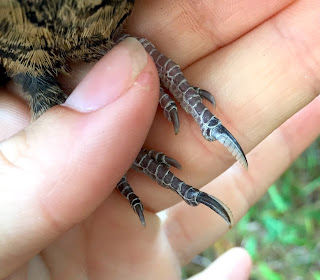Today was a slow day compared to the past week, but none the less exciting. We captured a total of 50 new birds and 10 recaptures today. The most exciting capture, however, was on the very first net run when we caught a Chuck-will's-widow!!!!
 |
| Chuck-will's-widow (After Hatch-year, female) |
This is a really awesome bird to catch in a mist net because they typically are nocturnal hunters and mostly active at night. Occasionally we will see these birds flying around the banding station in the early morning when we are opening nets. Today we were lucky enough to catch one!
Male Chuck-will's-widows will have distinct white patches in the outer rectrices. Our bird was lacking these white patches and showing clean black barring at the tips of the outer rectrices which indicated to us that she was an after hatch-year female. Hatch year birds will have indistinct barring and lack the broad buff tips to the outer rectrices.
 |
| Rectrices of After hatch-year, female |
This taxonomic family name for this species of bird is Caprimulgidae. The term caprimulgidae is derived from latin and literally means "goatsucker". The common name Goatsucker stems from an long disproven superstition that these birds would use their wide mouths to suck milk from goats at night. As insectivores they actually use their large mouths to catch insects while in flight. It is believed that they were attracted to these areas with live stock, such as goats, because of large insect populations.
This is a defense display used to scare away predators
by showing their large mouths!
Eating insects can be pretty tricky as well as messy! While adaptations such as narrow pointed wings, night vision, and extra wide mouths are useful for catching insects, its impossible to catch them all. It is believed that the pronounced rictal bristles surrounding the mouths of many insectivorous species function like a windshield to protect their eyes from missed captures or debris. Cleaning and preening feathers such as these rictal bristles could be pretty hard. It is believed that the specialized pectinate (comb-like) middle toe structures are used to clean and preen feathers including the rictal bristles.
|
|
We hope you enjoyed learning about this bird as much as we did!
-Kristen
Little Bear
Today was a bit slower relative to what we have been experiencing this past week with 53 new birds and 8 recaptures, comprised of 16 species. Noteworthy captures included an Eastern Kingbird and a Common Ground-Dove. The Common Ground-Dove is the smallest dove of North America. They breed in the southernmost part of the United States from Florida to California with South Carolina being one of the more northerly reaches of its range. Their habitat preference ranges from open areas to slightly scrubby areas and can be found breeding on the dunes of Kiawah Island.
 |
| Common Ground-Dove (after-hatch-year, male) |
-Mattie
| Species | Captain Sam's | Little Bear | ||
|---|---|---|---|---|
| New | Recaps | New | Recaps | |
Common Ground Dove
|
-
|
-
|
1
|
-
|
Chuck-will's-widow
|
1
|
-
|
-
|
-
|
Eastern Kingbird
|
-
|
-
|
1
|
-
|
White-eyed Vireo
|
-
|
1
|
-
|
-
|
Red-eyed Vireo
|
9
|
1
|
2
|
-
|
Carolina Chickadee
|
-
|
1
|
-
|
-
|
Carolina Wren
|
-
|
2
|
-
|
-
|
Veery
|
-
|
-
|
1
|
-
|
Gray Catbird
|
4
|
2
|
1
|
2
|
Northern Mockingbird
|
-
|
-
|
-
|
1
|
Yellow-breasted Chat
|
-
|
-
|
-
|
1
|
Ovenbird
|
-
|
-
|
1
|
-
|
Northern Waterthrush
|
-
|
-
|
2
|
1
|
Common Yellowthroat
|
24
|
-
|
24
|
1
|
American Redstart
|
2
|
-
|
-
|
-
|
Northern Parula
|
1
|
-
|
-
|
-
|
Yellow Warbler
|
1
|
-
|
7
|
-
|
Black-throated Blue Warbler
|
-
|
-
|
1
|
-
|
Palm Warbler (Western)
|
6
|
-
|
5
|
-
|
| Prairie Warbler | 1 | - | 4 | - |
| Northern Cardinal | - | 1 | 1 | - |
| Painted Bunting | 1 | 2 | 2 | 2 |
| Banding Stats | Captain Sam's | Little Bear | TOTAL |
|---|---|---|---|
| # Birds Banded |
50
|
53
|
103
|
| # of Recaptures |
10
|
8
|
18
|
| # of Species |
14
|
16
|
22
|
| Effort (net-hours) |
130
|
95.9
|
225.9
|
| Capture Rate (birds/100 net-hours) |
46.1
|
63.6
|
53.5
|
| # of Nets |
26
|
20
|
46
|
Banding Staff
Mattie VandenBoom (LB)
Michael Gamble (CS)
Kristen Oliver (CS)
Paul Carroll (CS)
Hannah Conley (LB)
Chris Snook (LB)
Jake Zadik (CS)
David McLean (CS)



No comments:
Post a Comment